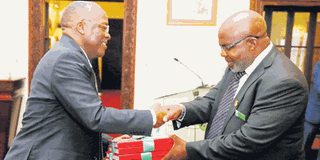CAG: Progress made, but...

President John Magufuli received Controller and Auditor General (CAG) report from Prof Mussa Assad (right) in Dar es Salaam. PHOTO|STATE HOUSE
What you need to know:
Prof Mussa Assad highlighted some notable achievements the government has registered in managing public funds, noting, however, that there was flagrant financial impropriety in some public institutions.
The Controller and Auditor General (CAG)presented his audit report for the 2016/17 financial year to President John Magufuli yesterday, detailing how some unscrupulous individuals were colluding with corrupt civil servants to misappropriate public funds.
Prof Mussa Assad highlighted some notable achievements the government has registered in managing public funds, noting, however, that there was flagrant financial impropriety in some public institutions.
The CAG specifically mentioned the National Social Security Fund (NSSF), Tanzania Revenue Authority (TRA), Tanzania Ports Authority (TPA) and National Identification Authority (Nida) as some of the public institutions whose financial records were tainted by questionable transactions or failure to execute their mandates professionally.
The list also includes Reli Assets Holdings Company (Rahco), Medical Stores Department (MSD), University of Dar es Salaam (UDSM) and Cashew nut Industry Development Trust Fund (CIDTF).
Billions lost at Rahco
Prof Assad said the country may have lost billions of shillings through dubious deals involving some officials at the now-disbanded Rahco.
The audit, said Prof Assad, had established that Rahco – which has since been merged with the Tanzania Railway Limited (TRL) to form the Tanzania Railway Corporation (TRC) – spent a total of Sh20 billion on a feasibility study in 2016/17 in a project that never took off.
“If you conduct a feasibility study, but you don’t implement the project, then taxpayers’ money is lost,” he observed. Similarly, Prof Assad said Rahco may have lost Sh194 billion through unremitted revenue from TRA.
MSD and UDSM
In his report, Prof Assad said MSD lost at least Sh4.5 billion through expired medicines that were not dispatched on time.
UDSM was also adversely mentioned after the university procured an electrometer and laboratory equipment at the cost of over $167,000 without a proper contract.
Nida office space
Another case of fraud was noted at Nida, where the government incurred a loss of Sh402 million due to falsified information on rented office space.
Another Sh167 million was lost when the Nida decided to make a transaction – apparently in foreign currency – using commercial bank rates instead of those provided by the Bank of Tanzania (BoT).
NSSF loans corruption
In his presentation, Prof Assad said that NSSF entered into partnership with four other institutions in which the former was to issue loans amounting to Sh60 billion.
But in unexplained circumstances, NSSF approved a total of Sh67 billion.
“There is a real possibility that the extra Sh7 billion will not be recovered as it was not cited in the agreement,” he noted.
The CAG added that TRA was engaged in a number of protracted tax cases with some taxpayers with the total amount of disputed uncollected dues reaching Sh4.4 trillion as of 2016/17.
TRA was also accused of laxity in the management of tax disputes in which a total of Sh739 billion is at stake.
Transit cargo diverted to local market
Another weakness, according to Prof Assad, was the handling of transit cargo, with the audit establishing that about 26 million tonnes of petroleum products destined for neighbouring countries were diverted to the local market.
In the process, he said, the government lost Sh14 billion in uncollected tax.
Unregistered smelters
“Again, there are 84 unregistered smelters, which are operating in Mwanza, Kahama and Shinyanga. If they were registered, the government would have earned up to Sh232 million in revenue,” Prof Assad said.
TPA weakness
On TPA, the audit established that still there are still monitoring weaknesses at the Tanzania International Container Terminal Services (Ticts). The CAG said more investment was needed for effective monitoring of containers so as to increase revenue.
“There are weaknesses that need strong intervention for the government to collect enough revenue from each container received at the port,” he added.




